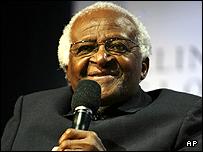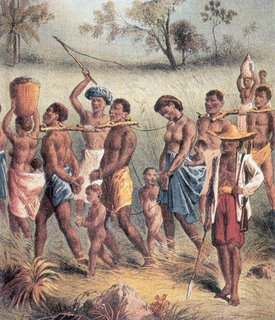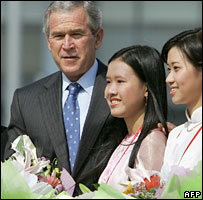Ahmadinejad's Plea and Tutu's Mission
 Iranian President Mahmoud Ahmadinejad wrote an open letter yesterday to the American people, expressing his support for Palestinians and outrage at the War on Terror.
Iranian President Mahmoud Ahmadinejad wrote an open letter yesterday to the American people, expressing his support for Palestinians and outrage at the War on Terror.Here is an excerpt:
We, like you, are aggrieved by the ever-worsening pain and misery of the Palestinian people.
Persistent aggressions by the Zionists are making life more and more difficult for the rightful owners of the land of Palestine...
You know well that the US administration has persistently provided blind and blanket support to the Zionist regime, has emboldened it to continue its crimes, and has prevented the UN Security Council from condemning it...
No people wants to side with or support any oppressors. But regrettably, the US administration disregards even its own public opinion and remains in the forefront of supporting the trampling of the rights of the Palestinian people...
Let's take a look at Iraq. Since the commencement of the US military presence in Iraq, hundreds of thousands of Iraqis have been killed, maimed or displaced. Terrorism in Iraq has grown exponentially.
In Iraq, about 150,000 American soldiers, separated from their families and loved ones, are operating under the command of the current US administration.
A substantial number of them have been killed or wounded and their presence in Iraq has tarnished the image of the American people and government...
Noble Americans, you have heard that the US administration is kidnapping its presumed opponents from across the globe and arbitrarily holding them without trial or any international supervision in horrendous prisons that it has established in various parts of the world.
God knows who these detainees actually are, and what terrible fate awaits them...
You have certainly heard the sad stories of the Guantanamo and Abu Ghraib prisons. The US administration attempts to justify them through its proclaimed "war on terror." But every one knows that such behaviour, in fact, offends global public opinion, exacerbates resentment and thereby spreads terrorism, and tarnishes the US image and its credibility among nations...
The US administration's illegal and immoral behaviour is not even confined to outside its borders. You are witnessing daily that under the pretext of "the war on terror," civil liberties in the United States are being increasingly curtailed.
Even the privacy of individuals is fast losing its meaning. Judicial due process and fundamental rights are trampled upon. Private phones are tapped, suspects are arbitrarily arrested, sometimes beaten in the streets, or even shot to death...
We all condemn terrorism, because its victims are the innocent. But, can terrorism be contained and eradicated through war, destruction and the killing of hundreds of thousands of innocents? If that were possible, then why has the problem not been resolved?...
I recommend that, in a demonstration of respect for the American people and for humanity, the right of Palestinians to live in their own homeland should be recognized so that millions of Palestinian refugees can return to their homes and the future of all of Palestine and its form of government be determined in a referendum. This will benefit everyone...
Now that Iraq has a constitution and an independent assembly and government, would it not be more beneficial to bring the US officers and soldiers home, and to spend the astronomical US military expenditures in Iraq for the welfare and prosperity of the American people?...
I'd also like to say a word to the winners of the recent elections in the US [...] Now that you control an important branch of the US government, you will also be held to account by the people and by history....
 Meanwhile Archbishop Desmond Tutu will be heading up a fact-finding mission into Beit Hanoun where 19 Palestinian died in Israeli shelling earlier this month.
Meanwhile Archbishop Desmond Tutu will be heading up a fact-finding mission into Beit Hanoun where 19 Palestinian died in Israeli shelling earlier this month.From the BBC:
Mr Tutu - the former archbishop of Cape Town - will report back to the UN's Human Rights Council in December.
The mission aims to "recommend ways to protect Palestinian civilians against further Israeli attacks", the UN says.
Israel has said the strike, which hit a civilian area in the Gaza Strip town, was due to a "technical failure".
Mr Tutu - the winner of the 1984 Nobel Peace Prize for his fight against apartheid in South Africa - will present his findings by the middle of December, the Geneva-based council said.
Earlier this month, the council approved a resolution that condemned "gross and systematic" human rights violations by Israel in the occupied Palestinian territories and ordered an inquiry into the Beit Hanoun incident.
Most of the victims were from one extended family. Several children and women were among the dead.
Palestinian leader Mahmoud Abbas has described the killings as a massacre, and demanded intervention by the United Nations.
Israel launched its operation in and around Beit Hanoun last month in an effort to root out militants firing rockets.















